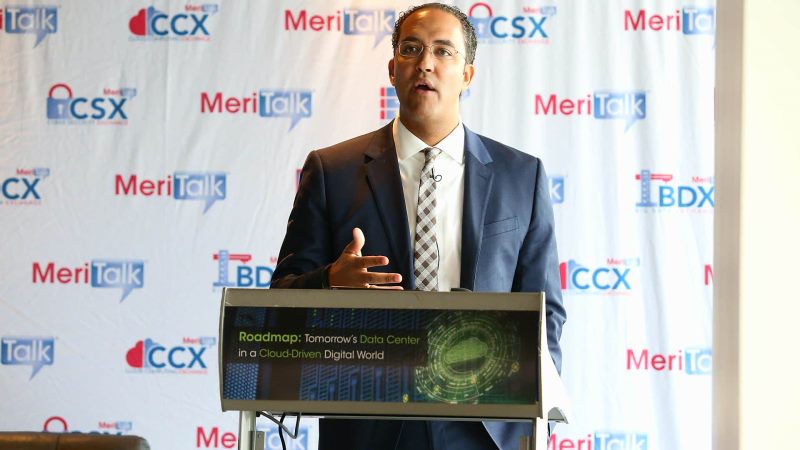
In a move to help Federal agencies streamline and modernize their technology infrastructure, President Trump signed the Modernizing Government Technology (MGT) Act into law today.
In a Roosevelt Room signing ceremony, President Trump signed the National Defense Authorization Act, with the MGT Act included as an amendment. For Rep. Will Hurd, R-Texas, and Sen. Jerry Moran, R-Kan., the signing is the culmination of more than a year spent championing the bill and shepherding it through the legislative process.
“Today, the president signed into law landmark legislation to reduce wasteful government IT spending and strengthen our nation’s cybersecurity,” said Moran. “I applaud the administration and my colleagues on both sides of the aisle for their tireless work to get this legislation signed into law and to bring our inefficient, outdated Federal IT system into the 21st century. The improved efficiencies from the MGT Act will empower agencies to modernize their legacy IT systems, better protect our data from cyberattacks and ultimately save billions in taxpayer dollars by reducing long-term spending.”
Hurd stressed that the legislation will help save taxpayer dollars through modernizing technology.
“Every year, the Federal government wastes billions of hard-earned taxpayer dollars maintaining outdated, unreliable, and unsecured IT systems–some of which were first designed in the 1960’s,” said Hurd. “The MGT Act will bring the government’s IT systems into the 21st century and allow agencies to use the money that is saved to modernize other systems, helping create more quality and timely services to the American people.”
The legislation received bipartisan support in both the House and the Senate. In the Senate, Sens. Moran and Tom Udall, D- N.M., introduced the legislation in the Senate with support from Sens. Steve Daines, R-Mont., and Sen. Mark Warner, D-Va. In the House, Rep. Hurd introduced the initial MGT legislation with Rep. Gerry Connolly, D-Va. Congressional leadership also praised the bill’s success.
“Within the National Defense Authorization Act that President Trump signed today is Representative Will Hurd’s Modernizing Government Technology Act, which establishes an IT modernization fund at executive branch agencies to upgrade their technology systems,” said House Majority Leader Kevin McCarthy, R-Calif. “Passing this legislation is exactly what the American people expect their representatives to do: see an obvious problem and work together on a practical solution to solve it.”
In addition the bipartisan support, the MGT Act is popular among industry stakeholders, including, but not limited to, the U.S. Chamber of Commerce, the IT Alliance for the Public Sector (ITAPS), Amazon Web Service, Cisco, Adobe, Brocade, Intel, Microsoft, CA Technologies, CSRA, and Unisys.
“Adobe would like to thank members of the House and Senate for passing the Modernizing Government Technology Act,” said John Landwehr, vice president & public sector CTO, Adobe. “The Federal government on average spends nearly 80 percent of its IT budget on servicing and maintaining legacy IT systems, making it difficult to invest in new technologies. The MGT Act creates a Technology Modernization Fund that will make it easier for government agencies to fund new IT projects, giving agencies the resources they need to deliver better, more secure, and less costly services and digital experiences to citizens.”
Larry Prior, president and CEO of CSRA, also released a statement praising the legislation.
“The Modernizing Government Technology Act is an important step in the journey to a next-gen Federal government,” said Prior. “The MGT gives agencies more resources to modernize, helping to enable moving to the cloud, implementing shared services, and improving their cyber defenses.”
Compuware CEO Chris O’Malley praised the fact that the bill deviated from traditional rip-and-replace modernization mentalities and instead gave agencies the flexibility to work in the way that best applies to them.
“One thing we like most about this bill is that it rejects a blanket rip-rewrite-and-replace strategy, empowering Federal IT to deploy proven private-sector approaches that sensibly exploit past investments that work well while leveraging the respective technology and economic virtues of the post-modern mainframe and the cloud,” said O’Malley.
The bill secured support from industry groups early on due to its push to move funding from maintaining legacy systems to deploying modern technology.
“The MGT Act is a prime example of bipartisan and innovative legislation that will benefit Americans across the country,” said Trey Hodgkins, senior vice president for ITAPS, when the MGT Act passed floor votes in the House and Senate last month. “For the first time, our Federal government will have funding to not only maintain its outdated technology but also infuse it with cutting-edge technologies that will protect Americans’ sensitive personal information and strengthen our nation’s cybersecurity in a cost-efficient way. We thank Rep. Hurd and his colleagues for their leadership and dedication to this crucial legislation.”
